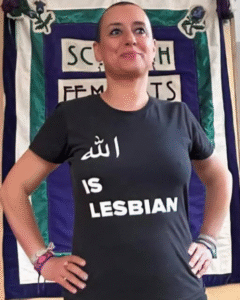A recent incident in Morocco has sparked significant controversy and debate after a woman wearing a T-shirt emblazoned with the provocative slogan “Allah is lesbian” was reportedly arrested and faced serious threats, including the threat of stoning. The event has drawn attention both locally and internationally, raising complex questions about freedom of expression, religious sensitivities, legal boundaries, and human rights in the country.
Morocco, a nation deeply rooted in Islamic traditions and values, has strict laws governing blasphemy and expressions considered offensive to religion. The arrest of the woman highlights the tensions between conservative cultural norms and the growing influence of social and political movements that challenge established views. This case has become a focal point for discussions on how societies balance respect for religious beliefs with the right to personal expression and dissent.
The T-shirt’s message, which many consider intentionally provocative and offensive, triggered a strong reaction among segments of Moroccan society. For devout Muslims, the slogan is seen as a direct insult to their faith, crossing lines of respect and reverence. The backlash reflects the powerful role religion plays in shaping social norms and laws in Morocco, where Islam is the official religion and deeply influences governance and daily life.
Authorities responded swiftly to the incident, citing laws that prohibit blasphemy and offensive speech against religion. The woman’s arrest was framed as an enforcement of these legal provisions designed to protect public order and religious harmony. However, the severity of the alleged threats against her, including stoning—a form of capital punishment rarely practiced in modern times but still feared—has alarmed human rights groups and international observers.
This case has sparked vigorous debates about the limits of free speech in Morocco. While the Moroccan constitution guarantees freedom of expression, it also restricts speech that is deemed to harm religious sentiments or public order. This duality creates a challenging environment for activists, artists, and citizens who seek to push boundaries or challenge orthodox views. The incident underscores the ongoing struggle between traditional values and evolving ideas about individual rights.
International human rights organizations have condemned the reported threats of stoning and called for the woman’s protection and a fair legal process. They emphasize the importance of safeguarding freedom of expression and ensuring that laws are not used to suppress dissent or minority viewpoints. The case has become a rallying point for advocates calling for reforms to align Morocco’s legal system with international human rights standards.
On social media, the incident has ignited polarized discussions. Some users defend the woman’s right to express herself, viewing her actions as a form of political or social protest against religious conservatism and patriarchal structures. Others strongly oppose the message, considering it disrespectful and inflammatory, which they argue justifies the legal actions taken.
The controversy also highlights broader issues in Moroccan society, including the status of women, LGBTQ+ rights, and the growing presence of “woke” or progressive ideologies that challenge traditional norms. The woman’s choice of slogan touches on sensitive themes related to sexuality, religion, and identity—areas that remain contentious and often taboo in the region.
This incident is not isolated but reflects a wider global conversation about freedom of speech, religious tolerance, and the clash between progressive values and conservative beliefs. Countries with strong religious traditions often face dilemmas in managing these tensions, balancing respect for faith with the protection of individual liberties.
Legal experts note that Morocco’s blasphemy laws are vaguely defined, leaving room for interpretation and potentially arbitrary enforcement. This ambiguity can lead to inconsistent application and heightened risks for those who express dissenting opinions. Critics argue that clearer legal frameworks are necessary to protect both religious freedoms and human rights.
The woman’s personal background, motivations, and response to the arrest have become topics of interest, though details remain limited due to the sensitivity of the case and ongoing legal proceedings. Supporters have rallied around her, calling for solidarity and emphasizing the courage it takes to challenge entrenched norms.
Religious leaders and conservative groups have voiced their condemnation of the slogan, emphasizing the importance of protecting the sanctity of religious symbols and beliefs. They warn against what they see as dangerous provocations that threaten social cohesion and respect for shared values.
Meanwhile, some progressives in Morocco and beyond view the incident as a wake-up call about the need for greater dialogue and understanding between different segments of society. They advocate for education, tolerance, and legal reforms to create space for diverse perspectives without resorting to threats or violence.
The international community is watching closely, with governments and human rights bodies urging Morocco to handle the case with fairness and respect for human dignity. The incident may influence Morocco’s reputation and relationships, particularly regarding its commitments to human rights and democratic principles.
As the situation develops, the case serves as a stark reminder of the challenges faced by individuals who confront deeply held beliefs in societies with strong religious identities. It underscores the delicate balance between freedom and respect, individual rights, and communal harmony.
In conclusion, the arrest and threats faced by the woman wearing the provocative T-shirt in Morocco have ignited a multifaceted debate about religion, freedom of expression, and human rights. The case exemplifies the ongoing tensions between tradition and modernity, highlighting the urgent need for dialogue, legal clarity, and protections that uphold both respect for faith and individual freedoms in a rapidly changing world.


